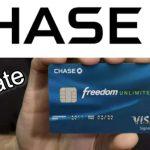Last Updated on July 1, 2024 by admin
Are you thinking of cancelling your credit card for reasons best known to you? or you want to close your credit card with zero balance? which ever way . This article will explain more details on how to carry out the simple task in a seamless and easy steps.
Chase credit card customers can cancel through phone, mail, or via the secure messages feature on the Chase website. If you’re thinking of canceling, be sure to consider the implications it will have to your credit score instead of cancelling your credit card you can upgrade or downgrade.
You can switch to a different credit card but staying with the same credit card issuer.To do this, call the customer service number on the back of your current card and ask what product changes you are eligible for. The customer service representative can assist you through this process over the phone.
Also read: How to activate chase credit card within minutes
However, before you cancel that chase credit card, you should have a second thought on how old is your account because a canceled account will no longer improve your score, also you should answer this simple question,Does your card have an annual fee? If yes you are liberty to cancel or ask your issuer to downgrade your account.If it doesn’t, there might be little upside to getting rid of it.
You should also ask yourself, Will cancellation of my Chase credit card affect my credit utilization ratio which is the money you owe on your credit cards, divided by your total credit card limit. Canceling a card will mean you have less credit available. Any outstanding balances are then taking up more of your available credit than before, which could negatively affect your credit score.
Why do customers cancel their credit card?
Customers cancel their credit cards for various reasons, including:
-
High Fees: Annual fees, late payment fees, or foreign transaction fees can make a credit card less attractive, leading customers to seek alternatives with lower or no fees.
-
High-Interest Rates: If a credit card has a high annual percentage rate (APR), customers may decide to cancel it and switch to a card with a lower interest rate to save money on interest payments.
-
Limited Rewards or Benefits: Some credit cards offer rewards programs or benefits that might not align with a customer’s spending habits or preferences. If the rewards or benefits aren’t valuable enough, customers might cancel the card.
-
Poor Customer Service: Negative experiences with customer service, such as difficulty resolving issues or long wait times, can prompt customers to cancel their cards.
-
Consolidating Debt: Customers might cancel a credit card to consolidate their debt onto a single card with a lower interest rate or to simplify their finances.
-
Financial Changes: Changes in financial circumstances, such as a decrease in income or an increase in debt, may lead customers to cancel a credit card to avoid overspending or accumulating more debt.
-
Security Concerns: If a customer experiences a security breach or fraudulent activity on their card, they might cancel it for security reasons.
-
Card Not Needed: Some customers may cancel a credit card simply because they no longer need it or use it.
-
Negative Impact on Credit Score: Closing a credit card can potentially lower a customer’s credit score, especially if it’s an older account or if it significantly reduces their available credit.
Also read: How to open Chase Bank Checking Account -Easily Steps
How to cancel chase credit card
To cancel Chase credit card kindly follow the steps below:
1. Pay off balance
2. Use rewards
3. Call issuer
4.Check your credit report
5, Destroy card
Read: How to register for Chase Online and mobile banking
To cancel your Chase credit card, you can follow these steps:
-
Pay off your balance: Before canceling, ensure you’ve paid off your entire balance to avoid incurring additional fees or interest charges.
-
Redeem rewards: Use any remaining rewards points or cashback you have on your card before canceling.
-
Contact Chase: There are a few ways to contact Chase to cancel your card:
- Phone: Call the customer service number on the back of your credit card or 1-800-432-3117.
- Chase app or website: Log in to your account and navigate to the customer service section.
- Mail: Send a letter to Chase requesting cancellation, including your name, account number, and address.
-
Verify cancellation: After canceling, check your credit report after 30-45 days to ensure the card is closed and no balance remains.
-
Destroy the card: Cut up your card to prevent any accidental use.
Will closing my Chase account affect my credit score?
Closing your Chase credit card could affect your credit score, but it depends on several factors:
- Credit Utilization: Closing a credit card can lower your overall available credit, potentially increasing your credit utilization ratio (the amount of credit you’re using compared to your total available credit). A high utilization ratio can negatively impact your credit score.
- Length of Credit History: Closing an older account can shorten your overall credit history length, which is another factor that influences your credit score. Newer credit history generally results in a lower score.
- Credit Mix: Closing a credit card might affect your credit mix, which is the diversity of credit accounts you have. Having a variety of credit accounts (credit cards, loans, etc.) is generally seen as positive by lenders.
However, if you pay off your balance before closing the card and have other credit accounts in good standing, the impact on your credit score may be minimal.
If you’re concerned about the potential impact on your credit score, you can contact Chase customer service and discuss your options. They may be able to offer alternative solutions, such as downgrading to a card with no annual fee or transitioning to a different Chase card.
How to minimize the impact to your credit
To minimize the impact on your credit score when closing a Chase credit card, follow these steps:
-
Pay Off the Balance: Make sure to pay off your entire outstanding balance on the card before closing it. Any remaining balance will continue to accrue interest and could negatively impact your credit utilization ratio.
-
Redeem Rewards: If your card offers rewards points or cashback, redeem them before canceling. You may lose these rewards if you close the account without using them.
-
Consider Alternatives: Before closing the card completely, explore other options:
- Downgrade: Ask Chase if you can downgrade to a similar card with no annual fee. This can help you maintain your credit history without the added cost.
- Product Change: Inquire about changing to a different Chase card that better suits your needs. This can also preserve your credit history.
-
Timing is Key: If possible, time the closure of your card after your statement cycle has ended. This ensures that your credit report reflects a zero balance on the closed account.
-
Maintain Other Credit Accounts: Keep your other credit accounts in good standing by making on-time payments and keeping your utilization low. This will offset any potential negative impact of closing the Chase card.
-
Monitor Your Credit Report: After closing the account, regularly monitor your credit report to ensure that it is accurately reflected. You can get a free credit report from each of the major credit bureaus annually at AnnualCreditReport.com.
Remember, closing a credit card should not be a hasty decision. Consider the potential impact on your credit score and explore alternatives before making a final choice.
How to calculate your credit utilization ratio
Your credit utilization ratio is the amount of credit you’re using compared to your total available credit. It’s a significant factor in determining your credit score, with a lower ratio generally being better. Here’s how you can calculate it:
For a single credit card:
- Find your current balance: This is the amount you currently owe on the card.
- Find your credit limit: This is the maximum amount you can borrow on the card.
- Divide your balance by your credit limit: (Balance / Credit Limit)
- Multiply by 100 to express as a percentage: (Balance / Credit Limit) * 100
Example: If you have two credit cards with balances of ₦30,000 and ₦20,000, and credit limits of ₦100,000 and ₦50,000 respectively:
($30,000 + $20,000) / ($100,000 + $50,000) * 100 = 33.33%
Ideal Credit Utilization Ratio:
Most financial experts recommend keeping your credit utilization ratio below 30%, with 10% or lower being ideal for maximizing your credit score.
Tips for Improving Your Credit Utilization Ratio:
- Pay down your balances: The most effective way to lower your ratio is to pay off as much of your outstanding debt as possible.
- Increase your credit limit: If you can’t pay down your balance immediately, try asking your credit card issuer for a credit limit increase. This will lower your utilization ratio without affecting your spending habits.
- Make multiple payments: If possible, make multiple payments throughout the month to keep your balance low.
Frequently Asked Questions
1. Will cancelling my Chase credit card affect my credit score?
Cancelling a credit card can potentially impact your credit score, especially if it leads to a higher overall credit utilization ratio or reduces the average age of your accounts. However, the extent of the impact may vary depending on your individual credit profile.
2. Can I reopen a closed Chase credit card account?
In some cases, it might be possible to reopen a closed Chase credit card account. However, it depends on various factors, including:
- Reason for Closure: If you closed the account yourself and it’s within a recent timeframe (usually 30 days), Chase might be able to reopen it. However, if Chase closed the account due to inactivity, delinquency, or other reasons, reopening might not be possible.
- Account Status: The account must be in good standing with no outstanding balance to be eligible for reopening.
- Chase’s Policy: Chase’s policies on reopening closed accounts may change, so it’s best to contact their customer service for the most up-to-date information.
3. What should I do with any remaining rewards or points on my Chase credit card after cancellation?
Before cancelling your Chase credit card, consider redeeming any rewards or points you have accumulated. If you have unused rewards, check if there are options to transfer them to another Chase card or to convert them into cash back or statement credits.
4. Are there any fees associated with cancelling a Chase credit card?
Chase typically does not charge a fee for cancelling a credit card. However, if you have an outstanding balance or are in the middle of a billing cycle, you may still be responsible for paying off the remaining amount. It’s important to settle any dues before closing the account to avoid additional charges.















